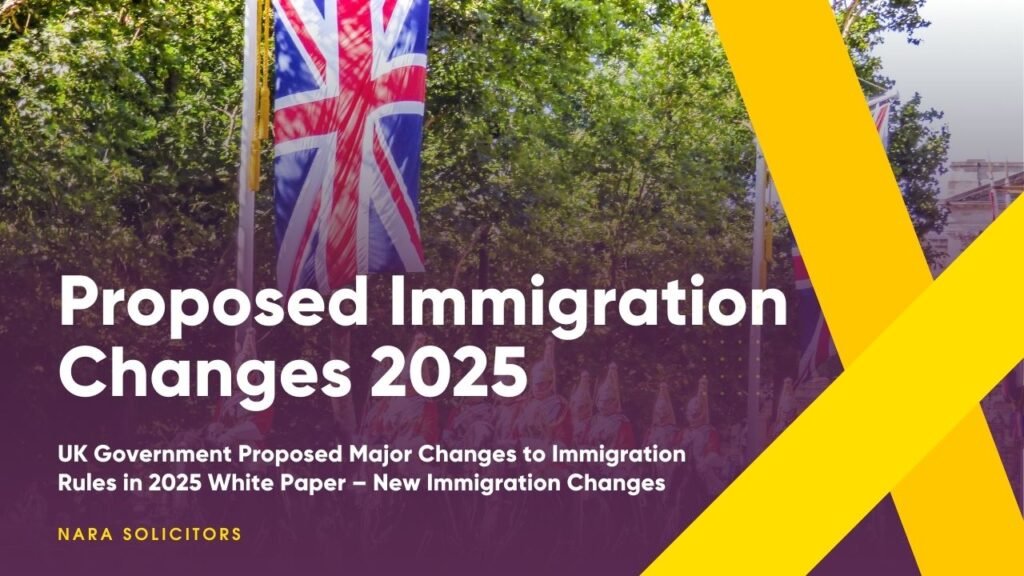-
Authorised and Regulated
by SRA, England and Wales
-
Proven track record in
sponsor license & visa applications
-
We are open Mon-Fri
9:00am to 6:00pm, 24/7 in emergency
UK Government Confirms Major Changes to Immigration Rules in 2025 White Paper

The UK Government has published a comprehensive White Paper titled Restoring Control Over the Immigration System (May 2025), outlining reforms that will significantly reshape the country’s immigration rules.
Summary of Proposed Immigration Changes in the UK Government’s May 2025 White Paper
Proposed Extension of ILR Residency Requirement to 10 Years
The government proposes to reform settlement rules by increasing the standard qualifying period for Indefinite Leave to Remain (ILR) from five to ten years.
Under the plan, settlement would no longer be automatic after five years. Instead, a revised Points-Based System would allow those making “Points-Based contributions to the UK economy and society” to qualify earlier.
Higher English Language Requirements Across Visa Categories
A number of proposals aim to raise the minimum English language requirements. The government plans to increase the English level required for Skilled Worker visas and settlement applications from B1 to B2.
New English Requirement for Adult Dependants
The White Paper proposes introducing a new English requirement for all adult dependants of workers and students, setting the minimum level at A1 (Basic User).
Closure of Overseas Care Worker Visa Route
The government proposes to close the care worker visa route for new overseas applicants. Existing workers already in the UK will be permitted to extend or switch in-country until 2028.
Stricter Rules for Student Sponsorship and Compliance
Education institutions sponsoring international students will be subject to higher compliance standards. Proposed changes include raising the minimum pass rate thresholds for Basic Compliance Assessments (BCA) and enforcing higher expectations on enrolment and course completion.
Planned Increases to Skill and Salary Thresholds
The government plans to raise the skill level for visa eligibility from RQF Level 3 to RQF Level 6 and to increase salary thresholds accordingly. The Immigration Skills Charge is also set to rise by 32%, in line with inflation.
………………………………
1. Changes for ILR and Settlement
According to the White Paper, the government intends to overhaul the Indefinite Leave to Remain (ILR) process by introducing a longer standard residency requirement and shifting toward a contribution-based “earned settlement” model.
While most migrants would need to wait 10 years to qualify for settlement, Individuals will have the opportunity to reduce the qualifying period to settlement and citizenship based on contributions to the UK economy and society.
Proposed Changes from the White Paper:
-
We will reform our settlement and citizenship rules by expanding the Points-Based System and increasing the standard qualifying period for settlement to 10 years.
-
Individuals will have the opportunity to reduce the qualifying period to settlement and citizenship based on contributions to the UK economy and society.
-
We will continue to offer a shorter pathway to settlement for non-UK dependants of British citizens to five years, and we will retain existing safeguards to protect the vulnerable, including settlement rights for victims of domestic violence and abuse.
-
We will create a new bereaved parent route, allowing those in the UK on the route of a parent of a British or settled child, but who have tragically lost their child, to settle immediately.
-
We will ensure children who have been in the UK for some time, turn 18 and discover they do not have status, are fully supported and able to regularise their status and settle. This will also include a clear pathway for those children in care and care leavers.
These are proposed changes and will not come into effect immediately. The government is expected to begin a consultation process later this year, with implementation likely from 2026 onward.
2. Changes for English Language Requirements
The government has proposed raising English language standards across nearly all visa routes. These proposals are aimed at encouraging long-term integration and reducing social and economic dependency among migrants.
Proposed Changes from the White Paper:
-
We will increase language requirements for Skilled Workers and workers where a language requirement already applies from B1 to B2 (Independent User) levels, in accordance with the Common European Framework of Reference for Languages (CEFR).
-
We will introduce a new English language requirement for all adult dependants of workers and students at level A1 (Basic User) to align to spousal and partner routes and will work towards increasing this requirement over time.
-
We will introduce requirements to demonstrate progression to level A2 (Basic User) for any visa extension, and B2 (Independent User) for settlement.
-
We will increase our existing requirements for settlement across the majority of immigration routes from B1 to B2 (Independent User).
-
We will reform our settlement and citizenship rules by expanding the Points-Based System and increasing the standard qualifying period for settlement to ten years.
3. Changes for the Care Sector and Low-Skilled Migration
A significant proposal involves closing the care worker visa route to new overseas applicants, reflecting the government’s intention to reduce reliance on low-paid foreign labour.
Proposed Changes from the White Paper:
-
We will close social care visas to new applications from abroad.
-
For a transition period until 2028, we will permit visa extensions and in-country switching for those already in the country with working rights, but this will be kept under review.
4. Broader Workforce and Labour Market Changes
To address long-term workforce needs, the government plans to raise salary thresholds, restore higher education skill levels, and introduce domestic recruitment strategies as prerequisites for visa access.
Proposed Changes from the White Paper:
-
We will lift the level for skilled workers back to RQF 6 and above. Salary thresholds will rise.
-
We will increase the Immigration Skills Charge for the first time since its introduction in 2017, by 32% in line with inflation.
-
We will establish the Labour Market Evidence Group to draw on the best data available in order to make informed decisions about the state of the labour market and the role that different policies should play, rather than always relying on migration.
-
We will launch new requirements for workforce strategies for key sectors where there are high levels of recruitment from abroad.
-
We will establish a new Temporary Shortage List to provide time-limited access to the Points-Based immigration system.
-
Access to the Points-Based immigration system will be limited to occupations where there have been long term shortages, on a time limited basis, where the MAC has advised it is justified, where there is a workforce strategy in place, and where employers seeking to recruit from abroad are committed to playing their part in increasing recruitment from the domestic workforce.
-
We will explore how to ensure that employers, using the immigration system, are incentivised to invest in boosting domestic talent, including options to restrict employers sponsoring skilled visas if they are not committed to increasing skills training.
What Happens Next?
Many of the proposed changes — particularly those requiring new legislation, such as the 10-year ILR rule and point-based settlement model — will not come into effect immediately. The government is expected to begin a consultation process later this year, with implementation likely from 2026 onward.
Here is the link to official white paper.
Important to clarify: this is just a white paper — not law. Nothing changes today.
We’ll review the detail, but major changes like ILR residence periods or skill thresholds usually don’t apply retrospectively. Transitional measures are likely. We’ll share updates soon. — Sukhvinder Nara

Get in touch with Nara Solicitors
Book a consultation with Nara Solicitors to get legal advise for your query.